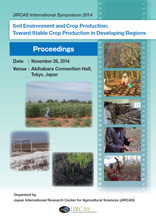N2Africa: Delivering Biological Nitrogen Fixation (BNF) Technologies To African Small-Scale Farmers For Enhancing Soil Fertility And Legume Production

There is increasing interest in application of microbial inoculants to crops for acquisition of nutrients
and improved nutrient-use efficiency. This would be of great importance to the resource-poor
smallholder farmers in sub-Saharan Africa (SSA), who experience low cereal and legumes yields
resulting from subsistence farming practices, soil fertility and unfavourable biotic and environmental
factors. Grain legumes offer several nutritional, economic and environmental advantages over other
crops, as result of symbiotic Biological Nitrogen Fixation (BNF). N2Africa aims at "putting nitrogen
fixation to work for smallholder farmers in Africa". Phase 1 of the program focused on increasing
grain legume production and its symbiotic N2-fixation for four major grain legumes (common bean,
cowpea, groundnut and soybean) in eight countries (DR-Congo, Ghana, Kenya, Malawi, Mozambique,
Nigeria, Rwanda and Zimbabwe). The program involved strategic research in legume agronomy and
BNF technology dissemination targeting 225,000 poor households over four years. Project partners
included international research centers, universities, international NGOs, national research and
extension organizations, farmer associations, private sector input producers and grain legume buyers.
To ensure rhizobia inoculants were available to farmers in the collaborating countries, N2Africa's
aimed to stimulate commercialization of inoculants production in East, South and West Africa within
four years in those countries (Kenya and Zimbabwe) producing rhizobia inoculants while encouraging
laboratories to explore new inoculants’ production techniques and quality control procedures (Malawi
and Rwanda). In 2006, MEA Fertilizer Company acquired rights in the production, marketing and
distribution of the legume inoculant with a trading name, BIOFIX
?
from the University of Nairobi.
The University of Nairobi, MIRCEN Laboratory ensures research for new elite strains and quality
production of BIOFIX
?
that is sent out to farmers in Eastern and Southern Africa, and plans are
underway to start production in Nigeria in 2015. The new product has seen the revolution of soybean
production in Kenya leading to an increase of soybean production from 600Kg/ha to 1200Kg/ha with
sales of the rhizobia inoculants rising from 1.5t/yr to over 30t/yr in within seven years. Partnership
with N2 Africa scientists has assisted in commercialization, as well as development of a legume blend,
Sympal (,NPK- 0:26:10) fertilizer which has further enhanced yields to a record 2500kg/ha. As such,
farmers have started seeing the benefits of growing soybean in Kenya and the number has since
increased. Under fertilized conditions (Sympal 0-23-16+ at 222 kg ha
-1
), climbing bean cv. Tamu and
soybean (SB 19) responded to inoculation with BIOFIX
?
during the 2013 long-rains with yields
increasing by +286 and +530 kg ha
-1
, respectively. Recommended practice (BIOFIX inoculant and
Sympal fertilizer) resulted in economic returns of 4.2:1 for bean and 3.1:1 for soybean as well as
improved nodulation. To date, improved grain legume and inoculation technologies were introduced to
37,464 Kenyan households with an adoption ratio of approximately 70%, average household benefits
of $350 per year (KSh. 30,117), and increased symbiotic N-fixation of 46 kg ha
-1
season
-1
.
Africa is a probable home to genetically diverse root-nodulating bacteria that present opportunities for
discovery of highly effective strains of inoculants. and bio-prospecting for elite strains of rhizobia
capable of effectively nodulating "promiscuous” and “specific” soybean and common beans in the
eight participating countries have collected 1434 isolates from 20 genera in 14 different ecological
zones, 85% belonging to the tribe Phaseoleae from Kenya, Democratic Republic of Congo (DRC) and
Rwanda. These isolates were tested against industry standard inoculants for bean (CIAT 899) and
soybean (USDA 110) and six of the isolates have consistently outperformed the standard commercial
strains and they soon to be released for commercial inoculants production in the near future to the
collaborating inoculant production industry(s) such like MEA Fertilizer Company. National
Biofertilizer Act that are based on the International standards are applied in all QC assessments and
N2Africa plans to assist producers to meet and monitor thresholds in both local and imported bioinoculants
in all project countries. Through these efforts, N2Africa BNF technologies and grain
legume enterprises have improved farm nitrogen balances, home nutrition and household incomes to
335,000 household in the 8 countries during the 4 years of implementation. Visit the program's website
at www.n2africa.org.
| 刊行年月日 | |
|---|---|
| 作成者 | Nancy K. N. Karanja Paul L. Woomer |
| 著者キーワード |
BNF N2Africa Rhizobia inoculants Sympal fertilizer smallholder farmer |
| 公開者 | Japan International Research Center for Agricultural Sciences |
| オンライン掲載日 | |
| 号 | 2014 |
| 開始ページ | 67 |
| 終了ページ | 79 |
| 権利 | Japan International Research Center for Agricultural Sciences |
| 言語 | eng |
